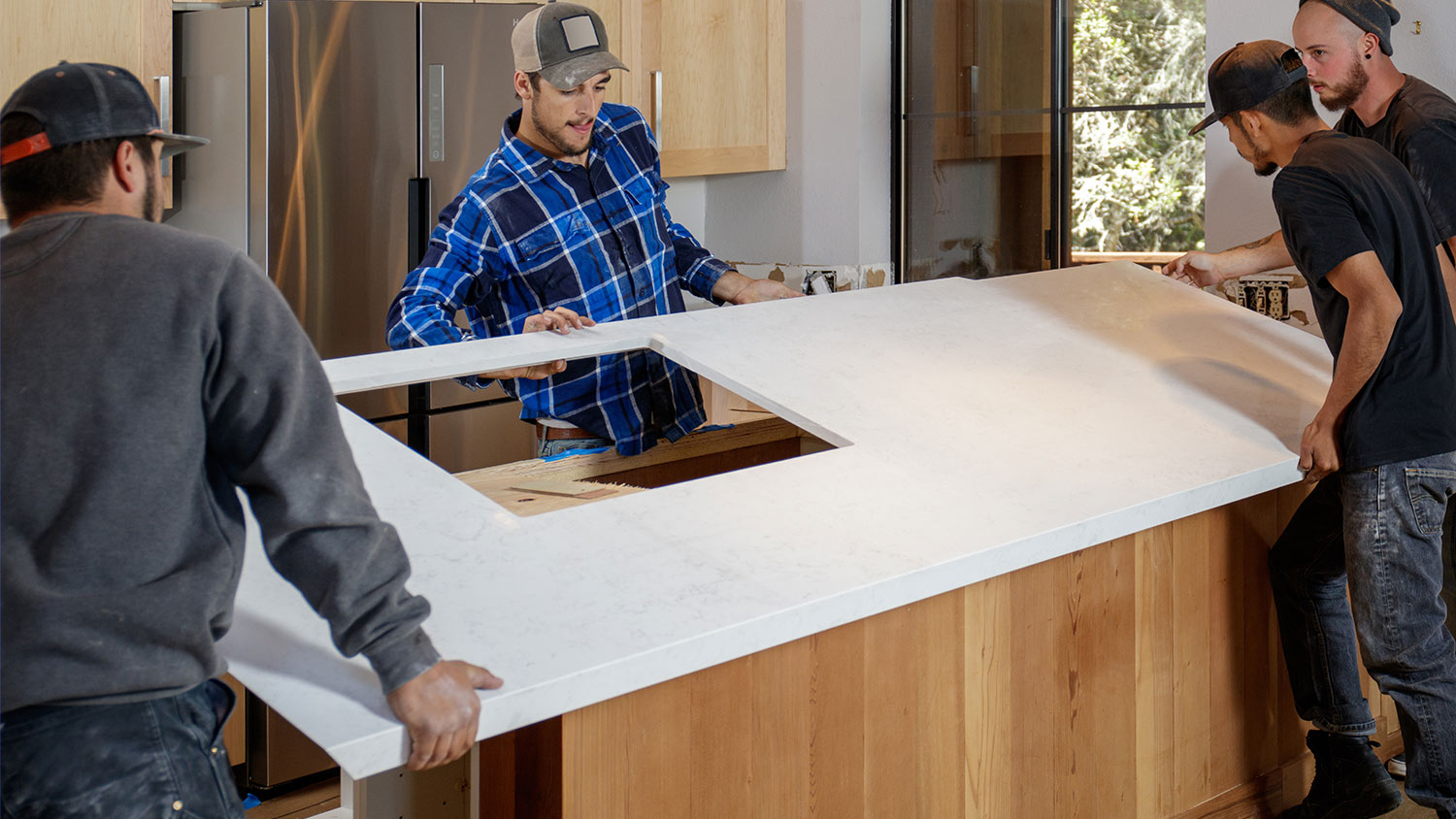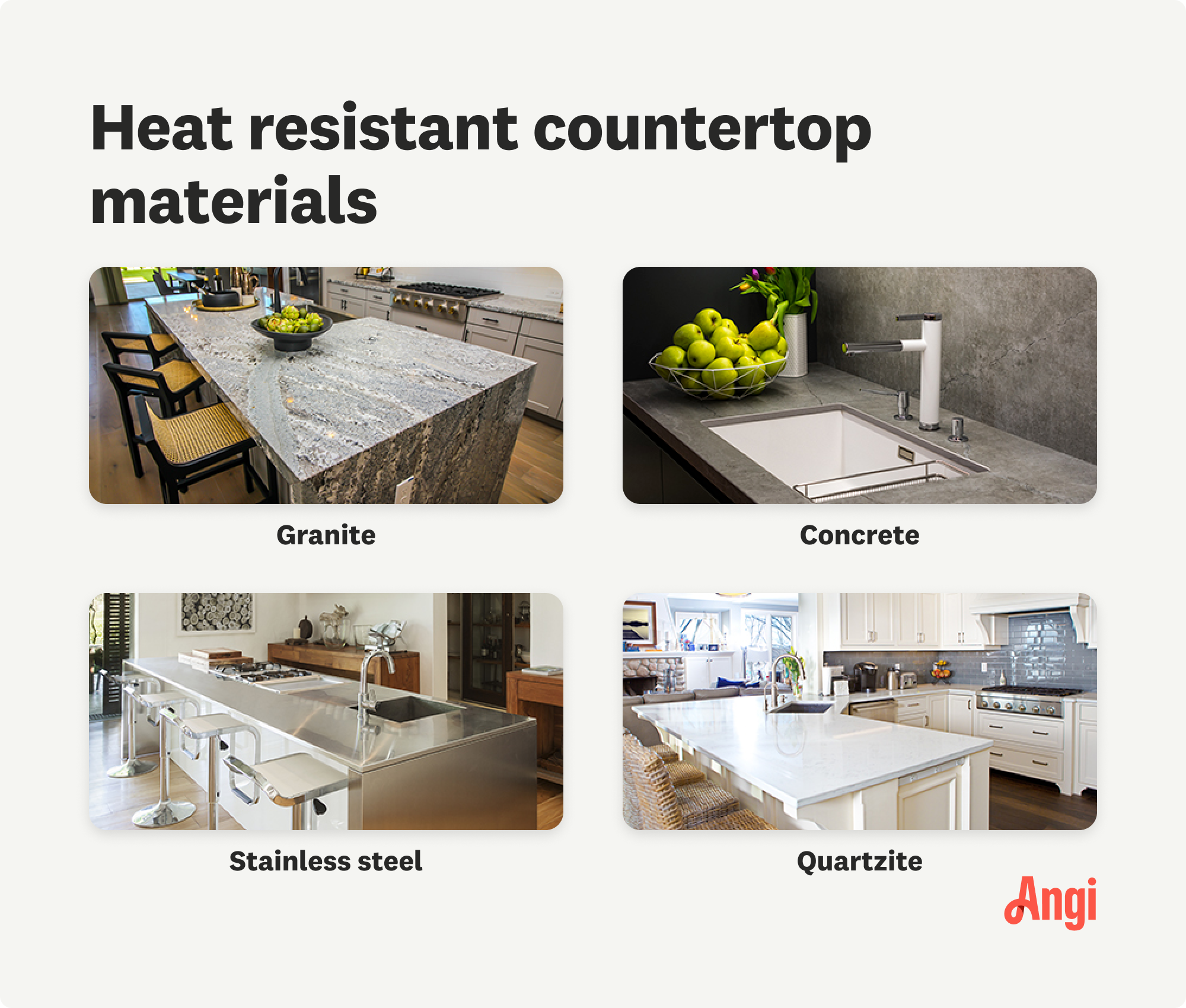
Discover cabinet installation cost estimates, including average prices, key cost factors, and tips to save on your new kitchen or bathroom cabinets.
Stainless steel countertops typically cost between $2,500 and $6,750 depending on whether they are custom or pre-fab, the metal guage, and the labor costs.


Stainless steel is a top-tier material (at a top-tier price) loved by professional and home chefs.
There’s no real alternative to stainless steel if you like the look and want the benefits of stain- and heat-resistance.
The best way to save money is to choose a prefabricated countertop, although availability depends on your kitchen’s layout.
Lower gauges (16 or less) are more durable, strong, and thick but cost much more.
Stainless steel countertops can scratch and dent and require a professional’s help to repair, so budget accordingly.
Stainless steel countertops aren’t just for the pros; if you’re an at-home chef looking to give your kitchen a major upgrade, this material might be worth the splurge. Stainless steel is sleek, durable, stain-resistant, and heat-resistant. It won’t rust either, thanks to its chromium content (according to Scientific American, all stainless steel contains at least 10% chromium)—but those benefits come at a cost.
Stainless steel countertops add costs to a kitchen remodel, but they can boost your kitchen’s overall appeal. The average 30-square-foot stainless steel countertop costs between $2,500 and $6,750 for materials and installation. Here’s how the costs break down.
Stainless steel countertops cost between $70 to $225 per square foot, including materials and professional installation. Custom steel countertops fall towards the higher end of the spectrum (around $140 to $215 per square foot) whereas prefabricated options cost less (around $70 to $85 per square foot). Most homeowners end up spending an average of $150 per square foot.
A typical base price for stainless steel countertops includes the hardwood or MDF backing and the cutouts for sinks and faucets, with customizations and upgrades adding more to the total. Otherwise, size and material are the largest factors impacting the cost of your countertop installation. Steel countertops are on the pricier side compared to other materials like laminate. Many homeowners find the cost worth it, but it depends on your needs and preferences. Here are the cost breakdowns to install stainless steel countertops in your home:
Depending on the features you choose, prefabricated stainless steel countertops run from $1,200 to $2,700. Prefabricated countertops are available in various shapes and sizes and some have an integrated sink, backsplash, and pre-configured edging.
As stated above, custom stainless steel countertops cost between $140 and $215 per square foot. With custom stainless steel countertops, you have more options and upgrades to choose from. But it’s essential to remember that each upgrade will increase your total cost. These customizations include:
Straight or L-shaped countertop styles
Custom dimensions
Preferred backing: MDF, plywood, or stainless channel
Finish choice: Matte, mirror, brushed, or scratchy/antique matte
Edges: Standard, marine, beveled, or bullnose
Custom edge height
The cost of materials for a stainless steel countertop is usually around $70 to $215 per square foot. The thicker the counter, the more it will cost. Stainless steel is more expensive than wood or Corian but less expensive than concrete or quartz countertops.
If you’re purchasing a stainless steel kitchen countertop on your own, you’ll have to pay to cut and fit the sheet metal. Generally, homeowners spend $700 to $2,100 on this process. Additional features cost:
| Feature | Cost |
|---|---|
| Faucet cutout | $20–$25 |
| Electrical Outlet cutout | $25–$30 |
| Sink cutout | $100–$250 |
Hiring a countertop installation pro to install your countertop usually costs around $30 to $100 per hour. This price works out to an additional $10 per square foot (excluding any plumbing work your kitchen remodel may need).
The bigger your space, the more it’s going to cost for materials. A small stainless steel island will cost less to install than a large commercial kitchen. The average kitchen has around 30 square feet of counter space.
Stainless steel comes in different gauges, which is the thickness of the steel. Lower gauges are more durable, strong, and thick. However, they are also more costly. Most residential homes use 16- or 18-gauge thick stainless steel. You can expect to pay between $50 and $200 per square foot to install 16- or 18-gauge stainless steel countertops.
If you’re remodeling your kitchen or replacing countertops, you’re going to have to remove your old countertop. This will add between $70 and $225 to the cost of your project (excluding sink removal). Some contractors include removal and disposal of your old kitchen materials in their service fees, but you’ll want to ask to make sure. If not, you’ll have to hire a junk removal service or rent a dumpster for an average of $385.

Don’t forget to budget for these add-on costs.
To keep your stainless steel countertops in working order, you should regularly wipe, scrub, and buff your countertop with a microfiber cloth and water or mild dish soap. For tougher stains or stubborn fingerprints, you can buff your countertops with a stainless steel cleaner, making sure to wipe with the grain.
You can expect to pay between $500 and $1,000 to repair stainless steel countertops. You’ll likely need a countertop pro to come in and repair any cracks, chips, or dents. If the damage is severe, you may need to replace the stainless steel covering altogether.
If you have carpentry and metalworks experience, you can save $30 to $100 per hour in labor costs. Countertop installation typically takes a full day, so you could save between $240 and $800 in labor.
To complete this project, you’ll need to purchase the proper tools, supplies, and countertop materials. For installations that require sinks and plumbing, you should go with a professional countertop installer and plumber. However, purchasing and installing a countertop for smaller jobs, such as building a kitchen island, is much easier.
You might save $10 per square foot by not calling a pro, but DIY countertop installation is a breeding ground for costly mistakes. It requires specific tools and meticulous knowledge—not to mention, stainless steel isn’t easy to cut. The safest option is to hire a local countertop installer.
If you insist on doing the project DIY, hire a local metal fabricator to make and cut your countertop (if you’re not already reaching for a prefab option). You should also never attempt any at-home plumbing. Leave sink replacement and pipe installation to a local plumber.
You can search for the best deal by getting three quotes from different pros. Overall, stainless steel kitchen countertops are a splurge, but there are ways to cut costs and work within a budget.
Purchase your own plywood base
Choose a prefab option rather than custom
Save the stainless steel for a designated prep area only
Crafting your countertops from stainless steel leads to a vastly different kitchen experience than using stone, wood, or laminate.
Durable: Stainless steel is stronger, safer, and lasts longer than other countertop materials.
Heat-resistant: Commercial kitchens use stainless steel counters because they’re heat-resistant and won’t burn like wood or laminate.
Stain-resistant: Messy cooks don’t have to fear steel counters because they are impervious to stains. This greatly stands out compared to other common countertop materials.
Rust-resistant: Stainless steel is an alloy of chromium and nickel, which makes it rust-resistant.
Hygienic: Steel is non-porous, so it’s easy to clean and less likely to form mold or mildew.
Sustainable: Steel is recyclable, making it an eco-friendly choice. Additionally, many stainless steel countertops are made with recycled material.
Price: Stainless steel isn’t the most expensive countertop material, but it’s pricier than average. If you want to save a little money, consider using stainless steel for a portion of the counter instead of the whole thing.
Scratches: Scratches show up easily on stainless steel. However, there are several methods to fade or remove most marks.
Smudges: Whether it’s from fingerprints, grease, or water spots, you’ll likely see streaks on stainless steel counters.
Dents: While stainless steel is resistant to chipping or cracking, it is prone to denting.
Noisy: Shuffling plates, bowls, and utensils across the counter is louder on stainless steel than most other materials.
Style: Even though stainless steel comes in different finishes, it always has a metallic appearance that can feel cold or industrial in homes.
Home is the most important place on earth, which is why Angi has helped more than 150 million homeowners transform their houses into homes they adore. To help homeowners with their next project, Angi provides readers with the most accurate cost data and upholds strict editorial standards. We extensively research project costs to develop the pricing data you see, so you can make the best decisions for you and your home. We rely on reputable sources, including the U.S. Bureau of Labor Statistics, academic journals, market studies, and interviews with industry experts—all to ensure our prices reflect real-world projects.
Want to help us improve our cost data? Send us a recent project quote to [email protected]. Quotes and personal information will not be shared publicly.
From average costs to expert advice, get all the answers you need to get your job done.

Discover cabinet installation cost estimates, including average prices, key cost factors, and tips to save on your new kitchen or bathroom cabinets.

Countertop repair costs may be the deciding factor between replacing or repairing your counter. Let’s break down the cost to repair, resurface, or relaminate.

Explore how much concrete countertops cost to install based on factors like their size, thickness, location, finish, and labor rates.

If you're a handy homeowner, learn how to make concrete countertops to create that contemporary kitchen character on a shoestring budget.

We share all the ins and outs for homeowners wondering how to epoxy countertops. Our tips will help you avoid all of the common project pitfalls.

Depending on the type of damage, you can repair a laminate countertop yourself—here are some tips to help restore your countertop.